Related Research Articles
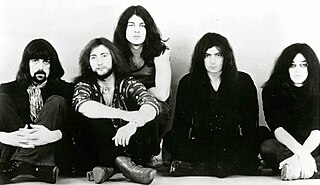
Deep Purple are an English rock band formed in London in 1968. They are considered to be among the pioneers of heavy metal and modern hard rock, although their musical style has varied throughout their career. Originally formed as a psychedelic rock and progressive rock band, they shifted to a heavier sound with their 1970 album Deep Purple in Rock. Deep Purple, together with Led Zeppelin and Black Sabbath, have been referred to as the "unholy trinity of British hard rock and heavy metal in the early to mid-seventies". Listed in the 1975 Guinness Book of World Records as "the globe's loudest band" for a 1972 concert at London's Rainbow Theatre, they have sold over 100 million records worldwide.
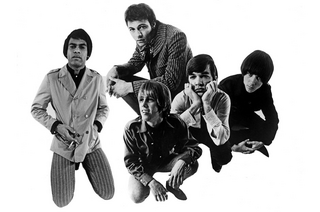
Love is an American rock band formed in Los Angeles in 1965. Led by Arthur Lee, the band's primary songwriter, they were one of the first racially diverse American rock bands. Their sound incorporated an eclectic range of styles including garage, folk-rock, and psychedelia. While finding only modest success on the music charts, peaking in 1966 when their US Top 40 hit "7 and 7 Is" made it to number 33, Love would come to be praised by critics as their third album, Forever Changes (1967), became generally regarded as one of the best albums of the 1960s.
? and the Mysterians are a Mexican-American garage rock band from Bay City and Saginaw in Michigan, initially active between 1962 and 1969. Much of the band's music consisted of electric organ-driven garage rock and an enigmatic image inspired by the 1957 Japanese science fiction film The Mysterians. In addition, the band's sound was also marked by the raw, resonating lead vocals of "?", making Question Mark and the Mysterians one of the earliest groups whose musical style is described as punk rock. Their music and imagery were highly influential on later bands.

Michael Bernard Bloomfield was an American blues guitarist and composer. Born in Chicago, he became one of the first popular music stars of the 1960s to earn his reputation almost entirely on his instrumental prowess, as he rarely sang before 1969. Respected for his guitar playing, Bloomfield knew and played with many of Chicago's blues musicians before achieving his own fame and was instrumental in popularizing blues music in the mid-1960s. In 1965, he played on Bob Dylan's Highway 61 Revisited, including the single "Like a Rolling Stone", and performed with Dylan at that year's Newport Folk Festival.

Al Kooper is an American retired songwriter, record producer, and musician, known for joining and naming Blood, Sweat & Tears, although he did not stay with the group long enough to share its popularity. Throughout much of the 1960s and 1970s he was a prolific studio musician, including playing organ on the Bob Dylan song "Like a Rolling Stone", French horn and piano on the Rolling Stones song "You Can't Always Get What You Want", and lead guitar on Rita Coolidge's "The Lady's Not for Sale". Kooper produced a number of one-off collaboration albums, such as the Super Session album that saw him work separately with guitarists Mike Bloomfield and Stephen Stills. In the 1970s Kooper was a successful manager and producer, recording Lynyrd Skynyrd's first three albums. He has had a successful solo career, writing music for film soundtracks, and has lectured in musical composition. Kooper was selected for induction for the Rock and Roll Hall of Fame in 2023.
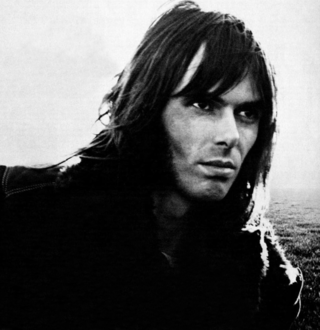
Nicholas Christian Hopkins was an English pianist and organist. He performed on many popular and enduring British and American rock music recordings from the 1960s to the 1990s, most notably on songs recorded by the Rolling Stones, the Kinks, the Who, the Beatles, the Steve Miller Band, Jefferson Airplane, Rod Stewart, George Harrison, John Lennon, Paul McCartney, Ringo Starr, The Hollies, Cat Stevens, Carly Simon, Harry Nilsson, Joe Walsh, Peter Frampton, Jerry Garcia, Jeff Beck, Joe Cocker, Art Garfunkel, Badfinger, Graham Parker, Gary Moore, Quicksilver Messenger Service and Donovan. He is widely considered to be one of the greatest studio pianists in the history of popular rock music.
Lone Justice is an American country rock band formed in 1982 by guitarist Ryan Hedgecock and singer Maria McKee in Los Angeles. The band released two albums, Lone Justice in 1985 and Shelter the following year, before disbanding in 1987.

Shades of Deep Purple is the debut album by the English rock band Deep Purple, released in July 1968 on Tetragrammaton in the United States and in September 1968 on Parlophone in the United Kingdom. The band, initially called Roundabout, was the idea of former Searchers drummer Chris Curtis, who recruited Jon Lord and Ritchie Blackmore before leaving the project. The Mk. I line-up of the band was completed by vocalist/frontman Rod Evans, along with bassist Nick Simper and drummer Ian Paice, in March 1968.

Deep Purple, also referred to as Deep Purple III, is the third studio album by the English rock band Deep Purple, released in June 1969 on Tetragrammaton Records in the United States and only in September 1969 on Harvest Records in the United Kingdom. Its release was preceded by the single "Emmaretta" and by a long tour in the UK, whose dates were interspersed between the album's recording sessions.
Tetragrammaton Records was an American record label founded in 1968 by music industry executives Roy Silver, Bruce Post Campbell, Marvin Deane, and comedian Bill Cosby. Silver, at the time, was also Cosby's manager. The term "Tetragrammaton" refers to the Hebrew name of God considered by some to be unspeakable. The label's most successful act was rock band Deep Purple.

Tons of Sobs is the debut studio album by the English rock band Free, released in the UK on 14 March 1969. While the album failed to chart in the UK, it reached number 197 in the US. Free are cited as one of the definitive bands of the British blues boom of the late 1960s, even though this is the only album of their canon that can strictly be called blues rock. It had the band's first minor hit "I'm a Mover", which was released as a single in December 1968.

Beck-Ola is the second studio album by English guitarist Jeff Beck, and the first credited to the Jeff Beck Group. It was released in June 1969 by Epic Records in the United States and the following August by Columbia Records in the United Kingdom. The album peaked at No. 15 on the Billboard 200, and at No. 39 on the UK Albums Chart. The album's title puns on the name of the Rock-Ola jukebox company.

The Kinks were an English rock band formed in London in 1963 by brothers Ray and Dave Davies. They are regarded as one of the most influential rock bands of the 1960s. The band emerged during the height of British rhythm and blues and Merseybeat, and were briefly part of the British Invasion of the United States until their touring ban in 1965. Their third single, the Ray Davies-penned "You Really Got Me", became an international hit, topping the charts in the United Kingdom and reaching the top 10 in the United States.
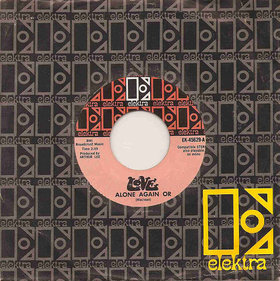
"Alone Again Or" is a song originally recorded in 1967 by the rock group Love and written by band member Bryan MacLean. It appears on the album Forever Changes, and was released as a single in the USA, UK, Australia, France and the Netherlands.
Mark–Almond was a jazz-influenced English pop group of the 1970s and early 1980s, sometimes also called The Mark-Almond Band. The core members were Jon Mark, who sang lead and played guitar, percussion, and harmonica, and Johnny Almond, who played saxophone, flute and bass flute and sang back-up. Various other musicians recorded and toured with the duo at various times, notably including drummer Dannie Richmond, a longtime associate of jazz bassist Charles Mingus.
Alun Davies is a Welsh guitarist, studio musician, recording artist, and composer who rose to fame primarily with his supporting guitar work and backing vocals as accompanist for English musician Cat Stevens from early 1970 to 1977.
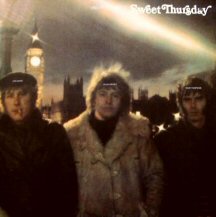
Sweet Thursday is the self-titled debut, and only, album by the late 1960s British rock band Sweet Thursday. Its chance of success was cut short by the almost-immediate failure of the record label.
The All-Stars were a short-lived English blues combo active in the early-mid 1960s. Originally known as the Cyril Davies (R&B) All-Stars, their later recordings are often credited to the Immediate All-Stars due to their releases on Immediate Records. In 1999, the group reformed as the Carlo Little All-Stars.
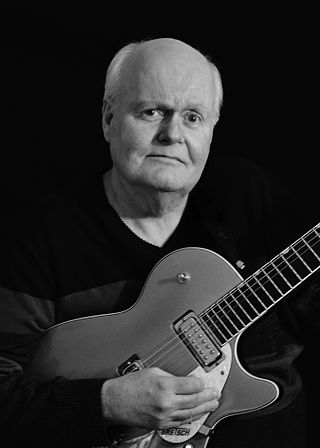
Jesse Willard "Pete" Carr was an American guitarist. Carr contributed session work to recordings by Joan Baez, Luther Ingram, Bob Seger, Paul Simon, Willie Nelson, Joe Cocker, Boz Scaggs, Percy Sledge, The Staple Singers, Rod Stewart, Barbra Streisand, Wilson Pickett, Hank Williams, Jr., and many others, from the 1970s onward.

John Michael Burchell, known professionally as Jon Mark, was an English singer-songwriter and guitarist, best known for his recordings with Marianne Faithfull, Sweet Thursday, John Mayall and Mark-Almond. Mark, who received a Grammy in 2004, lived in Rotorua, New Zealand.
References
- ↑ "Sweet Thursday: Biography". Allmusic . Retrieved 4 April 2010.
- ↑ "Tetra Turning to Radio to Promote Its Albums". Billboard . 16 August 1969. p. 46.
- ↑ "Signings". Billboard . 16 November 1968. p. 77.
- 1 2 George-Warren, Holly; Romanowski, Patricia; Pareles, Jon, eds. (2001). The Rolling Stone Encyclopedia of Rock & Roll (3rd ed.). Fireside Books. p. 608. ISBN 0-7432-0120-5.
- ↑ Eder, Bruce. "Sweet Thursday: Review". Allmusic . Retrieved 4 April 2010.